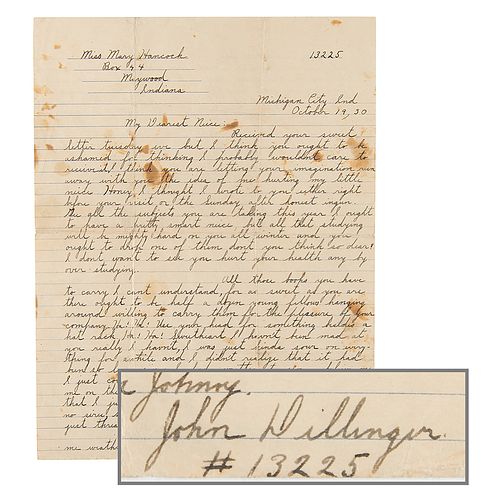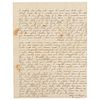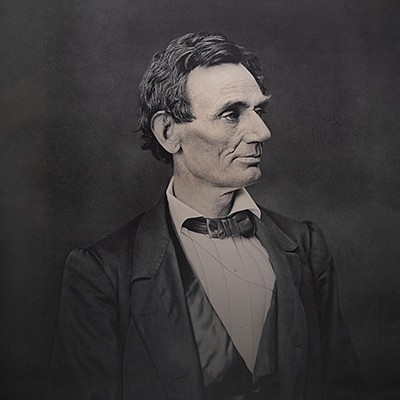John Dillinger Autograph Letter Signed from Prison: "I am broke right now but just you wait untill I get out"
Two ways to bid:
- Leave a max absentee bid and the platform will bid on your behalf up to your maximum bid during the live auction.
- Bid live during the auction and your bids will be submitted real-time to the auctioneer.
Bid Increments
| Price | Bid Increment |
|---|---|
| $0 | $5 |
| $50 | $10 |
| $200 | $25 |
| $500 | $50 |
About Auction
Feb 14, 2024
RR Auction's February Fine Autographs and Artifacts auction boasts 600 unique items, and honors Presidents' Day with a special section featuring incredible presidential autographs, artifacts, and memorabilia. RR Auction support@rrauction.com
- Lot Description
ALS signed "Love, Johnny" and "John Dillinger #13225," one page both sides, 8.5 x 11, October 19, 1930. Handwritten letter to his niece, Mary Hancock, written from the state prison in Michigan City, Indiana. In full: "Received your sweet letter Tuesday eve but I think you ought to be ashamed for thinking I probably wouldn't care to receive it. I think you are letting your imagination run away with you the idea of hurting my little niece. Honey I thought I wrote to you either right before your visit or the Sunday after honest ingun. Gee all the subjects you are taking this year I ought to have a pretty smart niece, but all that studying will be mighty hard on you all winter and you ought to drop one of them don't you think so dear? I don't want to see you hurt your health by over studying.
All those books you have to carry I can't understand, for as sweet as you are there ought to be half a dozen young fellow hanging around willing to carry them for the pleasure of your company. Ha! Ha! Use your head for something besides a hat rack. Ha! Ha! Sweetheart I haven't been mad at you really I haven't, I was just kinda sour on everything for a while and I didn't realize that it had been so long since I had written to you, believe me I just couldn't get mad at you; no, not even for putting me on the pan for being mean to Sis. You know honey that I just couldn't get along without your sweet letters no siree, so whenever you think it is your turn for a letter just threaten to stop writing.
No one ever wrote and told me whether Fred received the letter I wrote him or not I asked Sis when she came to visit me but she didn't know. As if I would ever give you notice to stop writing to me, young lady if I was out I would sure give you a good spanking and then a lot of kisses to take the sting out of that spanking. You tell her that red headed Sis of mine she had better not quit writing or I really will get mad at her I've only been peeved at her so far but that will make me mad an no fooling Dog gone it can't a fellow chew the rag at his sister. I ask you what chance has a mere man got when, if I get sarcastic with one of you I have both of you on top of me 'poor Emmett I feel so sorry for him' Ha! Ha!
Thanks for the handkerchiefs and send me some more soon also a fine tooth comb. If Sis has used up what money she had of mine write and let me know and I will send her some more. Margaret got married so if Sis doesn't hear from I will have Roscoe write to her about the eighth of next month and you can get that straightened out then. Say I thought by now you would surely have found that sweet little girl for me, you have well then why don't you sent me her picture? Gee nearly fifteen years old my! my! I would sure like to buy you something nice but I am broke right now but just you wait untill I get out.
Tell Hubert never mind about the handkerchiefs for I don't want him to use the last fifteen dollars I sent him I will write him soon and tell him what I want him to do with it. Honey I could just write a whole book to you this morning and here I have both pages full and I've hardly started. I sure hope this pleases you so when you write again you can say 'I just know my Uncle Johnny loved me to death.' Give my love to Sis and the kiddies and just lots to you." In very good to fine condition, with scattered staining, not affecting readability.
In 1924, John Dillinger was convicted of assaulting a grocer during a holdup, and expected to receive a light sentence by pleading guilty—only to be slapped with a stiff 10-20 years upon sentencing. His accomplice, an ex-convict and distant cousin named Ed Singleton, was sentenced to just two years for his role in the robbery. During Dillinger's nine-year stint in the Indiana Correctional System, he met and befriended a number of hard-core criminals who would later become part of his gang: Harry Pierpont, John Hamilton, Homer Van Meter, Fat Charley Makley, Russell Clark, and Walter Dietrich.
Dillinger was released in May 1933, after a petition bearing the signatures of almost 200 residents from his adopted hometown of Mooresville, Indiana—including that of his grocer victim—was presented to the governor. Embittered with the criminal justice system for having served what he felt was an unjust term, Dillinger quickly resumed a life of crime with his prison friends, whom he helped escape in a spectacular and well-planned breakout. He and the gang embarked on a bank robbing spree, conducting a dozen separate heists between June 21, 1933, and June 30, 1934—to the tune of well over $300,000.
In 1934, when J. Edgar Hoover named Dillinger 'Public Enemy Number 1,' Indiana Governor Paul V. McNutt's secretary, Wayne Coy, observed: 'There does not seem to me to be any escape from the fact that the State of Indiana made John Dillinger the Public Enemy that he is today. The Indiana constitution provides that our penal code shall be reformative and not vindictive...Instead of reforming the prisoner, the penal institutions provided him with an education in crime.' - Shipping Info
-
Bidder is liable for shipping and handling and providing accurate information as to shipping or delivery locations and arranging for such. RR Auction is unable to combine purchases from other auctions or affiliates into one package for shipping purposes. Lots won will be shipped in a commercially reasonable time after payment in good funds for the merchandise and the shipping fees are received or credit extended, except when third-party shipment occurs. Bidder agrees that service and handling charges related to shipping items which are not pre-paid may be charged to a credit card on file with RR Auction. Successful international Bidders shall provide written shipping instructions, including specified Customs declarations, to RR Auction for any lots to be delivered outside of the United States. NOTE: Declaration value shall be the item’(s) hammer price and RR Auction shall use the correct harmonized code for the lot. Domestic Bidders on lots designated for third-party shipment must designate the common carrier, accept risk of loss, and prepay shipping costs.
-
- Buyer's Premium



 EUR
EUR CAD
CAD AUD
AUD GBP
GBP MXN
MXN HKD
HKD CNY
CNY MYR
MYR SEK
SEK SGD
SGD CHF
CHF THB
THB






